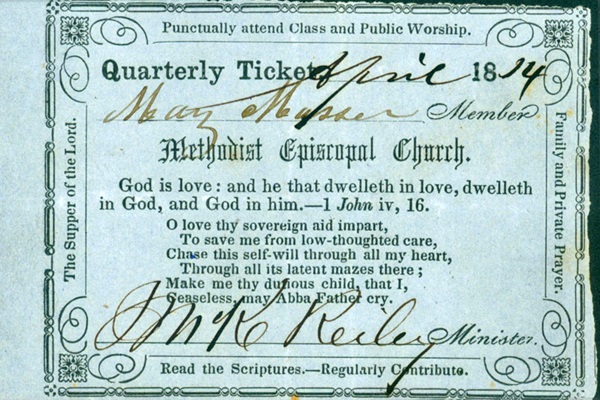Nearly all the leaders of the early Methodist societies were lay people. John Wesley established a system to develop and empower them by organizing them in small groups for accountability and support for living the Christian life. The intent was to help people become disciples who live out their love of God and neighbor.
Each week, the small groups - or “classes” - of 12-15 members of a Methodist society met weekly with their class leader to give an account of how they were living their faith as they answered the question: “How is it with your soul?” guided by the Methodist rule of life, the General Rules.
Class leaders, appointed by Wesley, were lay women and men who could be trusted with the spiritual formation and care of others. They served as role models, mentors, and discipleship coaches for the Methodists in their pursuit of holiness of heart and life. Class leaders shared in the pastoral work that needed to be done when the appointed clergy, or circuit rider, was absent. They were the disciples who made disciples.
The General Rules are simple and straightforward practices intended to help people live out the teachings of Jesus as summarized in Matthew 22:37-40 (NRSV):
Small Groups Today
“’You shall love the Lord your God with all your heart, and with all your soul, and with all your mind.’” This is the greatest and first commandment. And a second is like it: ‘You shall love your neighbor as yourself.’ On these two commandments hang all the law and the prophets.”
The class members formed habits of (1) doing no harm by avoiding evil of every kind; (2) doing good to all people; and (3) attending upon all the ordinances of God, like participating in worship, receiving communion, reading the Bible, praying, and fasting.
Doing no harm and doing good helped the Methodists love their neighbors as themselves. By “attending upon all the ordinances of God” they learned to love God with all their heart, soul, and mind.
And by meeting together in this way every week they were “watching over one another in love.”
Wesley observed, “Advice or reproof was given as need required, quarrels made up, misunderstandings removed: And after an hour or two spent in this labour of love, they concluded with prayer and thanksgiving.” (A Plain Account of the People Called Methodists, II.6)
Requiring all Methodists to meet weekly in their class meeting, and then in the larger society meeting on Sunday night, was the primary way John Wesley equipped and empowered lay members. This weekly discipline of mutual accountability, encouragement, and support for living the Christian life changed people’s lives and equipped lay people to participate with Christ in God’s mission in the world.
This content was produced by Ask The UMC, a ministry of United Methodist Communications.





